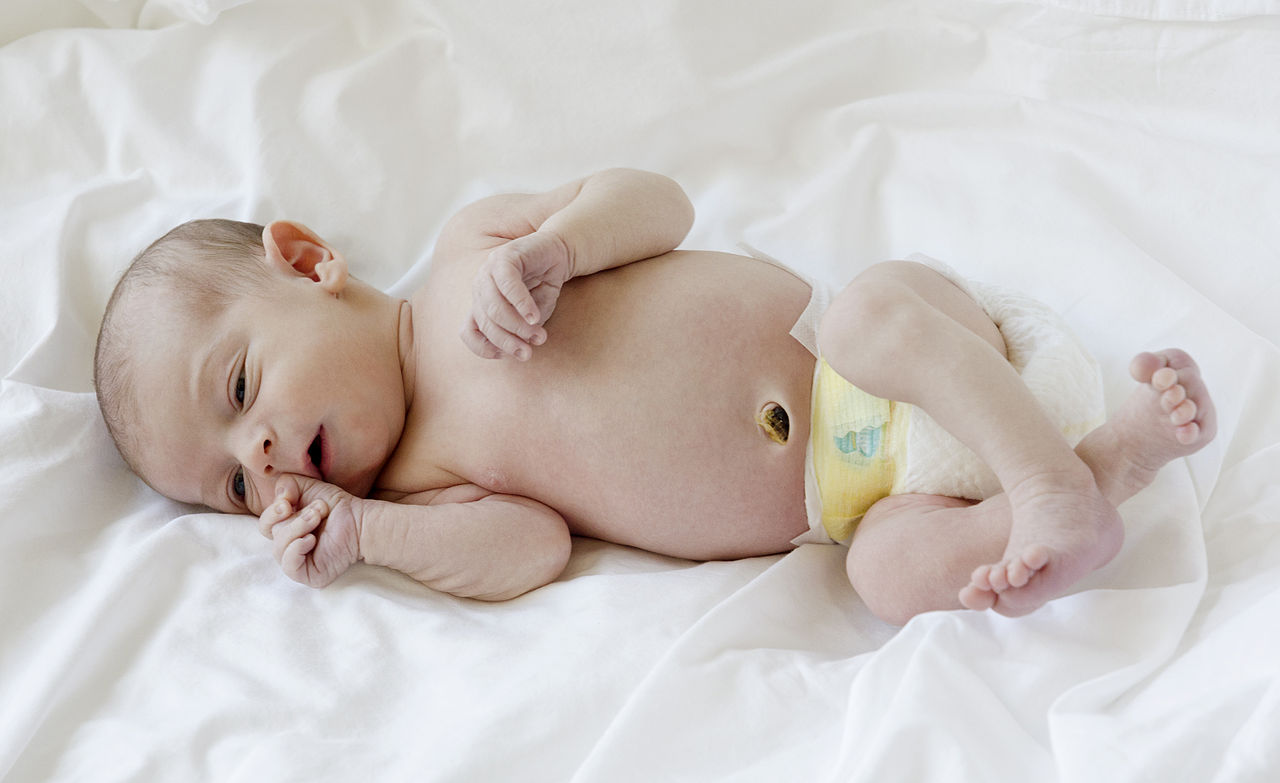Playlist
Show Playlist
Hide Playlist
General Infant Care
-
Slides NewbornAnticipatoryGuidance Pediatrics.pdf
-
Download Lecture Overview
00:01 Okay. 00:02 Umbilical cord care. 00:04 The mom's going to want to know what to do with the umbilical cord. 00:08 We used to recommend all kinds of interesting things like cleaning with alcohol, none of it is necessary. 00:14 Basically, keep it clean, keep it dry, fold the diaper just below the cord and you can show mom how to do that. 00:21 If it’s dirty, you may wash it gently with soap and water. 00:24 It generally falls off at two to three weeks. 00:27 If there’s a delay in detachment, certainly for more than two months, you have to consider a rare disease called a leukocyte adhesion defect. 00:37 This is when the white blood cells have a hard time binding to the cell adhesion molecules on the side of the blood vessel and allowing those white blood cells to crawl into a tissue. 00:48 These patients will have a normal CBC, but a history of a delayed cord detachment may make you think of it. 00:56 Also, parents should watch out for omphalitis. 00:59 Omphalitis is an infection of the belly cord. 01:03 It’s pretty significant. 01:04 When kids get a redness or an irritation around the cord and it becomes infected with heat, red, warmth or pus, that’s an emergency. 01:14 That baby needs to be seen right away because those kids -- it can develop into a peritonitis very quickly. 01:20 They can get very sick. 01:22 How do we care for their skin in their diaper? We should do sponge baths until the stump falls off, then they can do regular baths. 01:30 Frequent diaper changes are important to avoid diaper rashes. 01:36 Expect some vaginal bleeding from your infant girl or vaginal discharge from your infant girl, that’s common. 01:43 It’s because the baby was exposed to mom’s hormones. 01:47 Also in circumcised boys, keep the site clean and covered with Vaseline gauze like she was shown until it’s healed over. 01:57 Okay. 01:58 Moms with newborn babies want to know when to call a doctor. 02:02 Any newborn who has fever, that’s an emergency and they need to be seen, certainly for the first 4-8 weeks of life. 02:08 So, teach them how to use a rectal thermometer. 02:12 They should not put it in their ear. 02:13 They should not put it in their mouth. 02:15 All infants should use rectal thermometers. 02:17 A digital thermometer is cheap. 02:19 You can buy them in a store for 5-10 bucks. 02:22 So any fever more than 38 degrees rectally -- use a little Vaseline -- is a reason to call the doctor. 02:31 If the baby is sleeping or is lethargic but is sleeping too much, that’s a reason to call the doctor. 02:38 But watch out, for the first few days of life, the average baby sleeps almost 20 hours a day. 02:43 So they can expect, they will gradually wake up more and more over the first several weeks of life. 02:49 Any forceful emesis or specifically green emesis is an emergency. 02:55 Any infant who has diarrhea should probably be evaluated. 03:00 They are prone to dehydration easily. 03:02 Any child with blueness to the skin or difficulty breathing should be evaluated immediately. 03:08 And any infant with a jaundice that's worsening should be evaluated immediately. 03:12 So all of these are reasons for parents to call the doctor when their infants are doing something odd. 03:19 What about safety? It turns out safety is very important. 03:23 Car seats in the United States are not used frequently enough and are often installed incorrectly. 03:30 So, parents should be taught about car seat installation and they should know what center near them where they can get that checked if they can’t figure it out. 03:37 Most cars now have the latch system which makes it pretty easy to install. 03:42 But without latch system, it can be quite hard. 03:47 Patients should be taught to sleep facing up. 03:50 We call this sleep hygiene. 03:52 It’s not the baby who’s hygienic, it’s the crib. 03:55 So SIDS or sudden infant death syndrome is associated with babies who sleep on their belly. 04:01 It’s also associated with babies who sleep with too much bedding or pillows around. 04:05 They should teach these parents how to swaddle their baby and leave them with a simple blanket and let them sleeping face up. 04:14 Counsel parents about immunizations and how they are going to continue and that they're are huge part of staying healthy. 04:20 Immunizations are always good for infants. 04:23 They’re really a good thing. 04:24 On average, infants do much better if they’re immunized than if they’re not by far, so encourage families to immunize. 04:32 Warm them about crying, this sounds like a weird discussion to have, but it’s normal for babies to cry. 04:39 It’s normal. 04:41 It doesn’t mean something bad is going on. 04:43 It doesn’t mean you’re failing as a parent. 04:45 Sometimes the crying can really get to parents. 04:49 It can really bother them and they have to be taught that crying is okay. 04:55 Sometimes parents start to hit the edge. 04:58 Sometimes mom or dad needs to take a time out. 05:02 They need to leave the baby with the grandparent or babysitter and take a break. 05:06 If the baby is too fussy and the parents start getting frustrated like they want to shake the baby or be angry with the baby, they need to put the baby down, walk to the other room and take a personal time out. 05:20 Child abuse is common in United States. 05:23 A lot of parents feel guilty afterwards. 05:26 They were just so overwhelmed with the parenting. 05:29 They shook the baby. 05:30 They didn’t know and then the baby has brain damage. 05:33 So we need to encourage parents to be able to rely on each other, to take turns, to give each other personal time outs. 05:40 Time when they’re away from the baby so that when they’re with the baby, they can be the support of caring parent they need to be. 05:47 So that’s my review of basically all the advice you need to give the parents before they go home from the hospital. 05:54 Thanks for your time.
About the Lecture
The lecture General Infant Care by Brian Alverson, MD is from the course Neonatology (Newborn Medicine).
Included Quiz Questions
Which type of care listed below is NOT routinely indicated in newborn infants in the US?
- Alcohol cleaning of the umbilical stump
- Sponge baths until the umbilical stump falls off
- Frequent diaper changes to prevent rash
- Safe car seat installation
- Proper sleep hygiene
What is the normal time for umbilical cord exfoliation?
- 1–3 weeks
- 1st day
- 1–2 months
- 2-3 days
- > 2 months
Which of the following does NOT improve an infant's safety?
- Placing infant in prone position during sleep
- Installing a car seat
- Immunization
- Avoiding excessive bedding
- Taking a timeout from directly caring for the baby
Customer reviews
5,0 of 5 stars
| 5 Stars |
|
2 |
| 4 Stars |
|
0 |
| 3 Stars |
|
0 |
| 2 Stars |
|
0 |
| 1 Star |
|
0 |
The essential information, well structured and presented. It will help me with the parents to provide better advice.
really great lecture, covered clinical information really well but also holistic care which is so important!!





